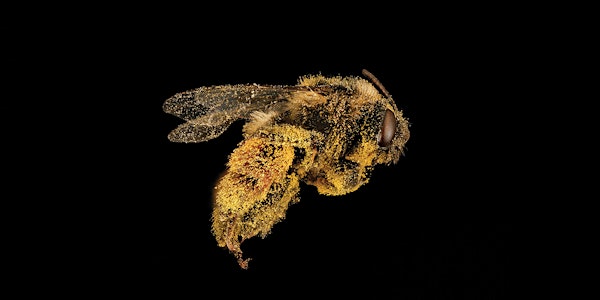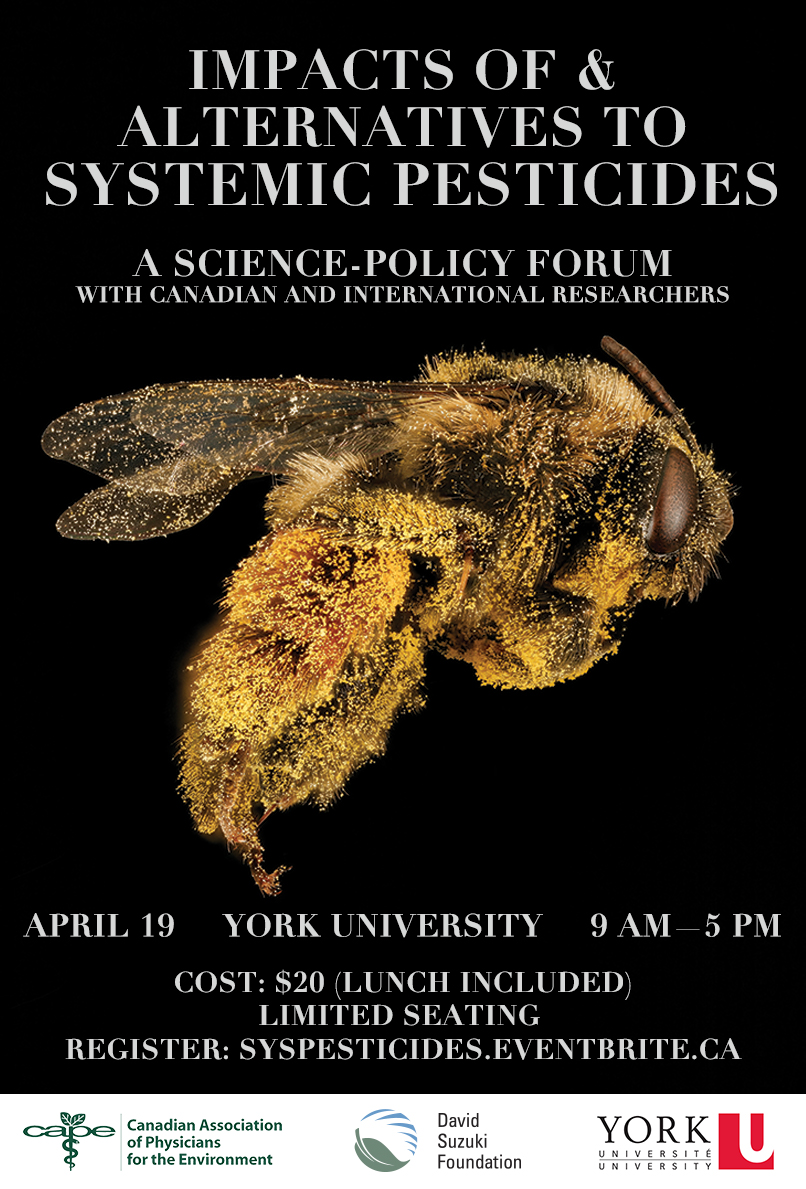
Impacts of and alternatives to systemic pesticides: a science-policy forum
Date and time
Location
Lecture Hall 103, Life Sciences Building, York University
4700 Keele Street Toronto, ON CanadaRefund Policy
Description
Large-scale prophylactic use of systemic insecticides is having significant unintended negative ecological consequences on biodiversity, particularly pollinators. Adverse impacts have also been documented on a wide range of other non-target organisms in terrestrial, aquatic, wetland, marine and benthic habitats. Because of these impacts, the Government of Ontario, has recently brought in strict restrictions on the use of neonicotinoid insecticides as part of a wider strategy to promote pollinator conservation in the Province.
The David Suzuki Foundation and York University are presenting a one-day symposium on the impacts and alternatives to systemic pesticides with invited scientists from across Canada, Europe, and the Far East. Among the scientists who will be speaking at the symposium, are members of the International Task Force on Systemic Pesticides (TFSP), whose ground-breaking research on the impacts of neonicotinoid insecticides has has played a significant role in helping to educate policy-makers on the impacts of neonicotinoid pesticides, and the need for alternatives.
This one-day symposium will be of great interest to government policy-makers, university researchers and students, stakeholders and the agricultural sector
Cost: $20 (Lunch included)
Limited seating.
Speakers:
- Hon. Glen Murray, Minister of Environment and Climate Change, Government of Ontario.
- Dr. Laurence Packer, Department of Biology. York University. Pollinator conservation in Canada.
- Dr. Maarten Bijleveld van Lexmond, Chairman, Task Force on Systemic Pesticides (TFSP), Neuchâtel, Switzerland. Systemic pesticides and the TFSP: a historical perspective.
- Dr. Jean-Marc Bonmatin, Deputy Chairman TFSP. CNRS-Center for Molecular Biophysics (CBM), Orléans, France. Agricultural use of neonicotinoid insecticides and their impacts on biodiversity.
- Dr. Amro Zayed, Department of Biology. York University. The magnitude and consequences of systemic pesticide exposure on honey bee health in Canada’s corn growing regions.
- Dr. Nigel Raine, School of Environmental Sciences. University of Guelph. Impacts of systemic pesticides on bees: from individual behaviour to pollination services.
- Dr. Elizabeth Lumawig-Heitzmann. Secretary of TFSP Public Health Working Group. Marinduque Biological Field Station, Philippines. Use of systemic pesticides in the developing world. A case study from the Philippines.
- Dr. David Kreutzweiser. Research Scientist, Canadian Forest Service, Natural Resources Canada. Risks of neonicotinoid insecticides to soil invertebrates.
- Dr. Kumiko Taira. Chair of TFSP Public Health Working Group. Tokyo Women’s Medical University, Japan. Human health impacts of exposure to neonicotinoid insecticides: recent memory loss and human neonicotinoid exposure.
- Dr. Lorenzo Furlan. Chairman of TFSP Working Group on Alternatives. Veneto Agricultura, Centre for Agricultural Research in co-operations with the University of Padua, Italy. A new strategy for agriculture without the use of neonicotinoids. Protection of growers by a mutual insurance against pitfalls.
- Dr. Charles Vincent, Saint-Jean-sur-Richelieu Research and Development Centre. Agriculture and Agri-Food Canada. Alternatives to insecticides: a reality check.
- Graeme Murphy. Integrated Pest Management and alternatives to systemic pesticide application in Ontario horticulture. IPM and Biological Control Consultant.
Who are the Task Force on Systemic Pesticides?
The Task Force on Systemic Pesticides is an independent group of scientists from all over the globe, who came together to work on the Worldwide Integrated Assessment of the Impact of Systemic Pesticides on Biodiversity and Ecosystems. The mandate of the Task Force on Systemic Pesticides (TFSP) has been “to carry out a comprehensive, objective, scientific review and assessment of the impact of systemic pesticides on biodiversity, and on the basis of the results of this review to make any recommendations that might be needed with regard to risk management procedures, governmental approval of new pesticides, and any other relevant issues that should be brought to the attention of decision makers, policy developers and society in general.
A highly multidisciplinary team of 30 scientists from all over the globe have jointly made a synthesis of 1,121 published peer-reviewed studies spanning the last five years, including industry-sponsored ones. Key findings of the Task Force have been presented in a special issue of the peer reviewed scientific journal “Environmental Science and Pollution Research” entitled “Worldwide Integrated Assessment of the Impacts of Systemic Pesticides on Biodiversity and Ecosystems”. http://www.tfsp.info/




Organized by
Through evidence-based research, education and policy analysis, we work to conserve and protect the natural environment, and help create a sustainable Canada. We regularly collaborate with non-profit and community organizations, all levels of government, businesses and individuals.